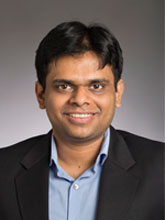In our series, The ECS Community Adapts and Advances, Venkat Viswanathan shares stories of unexpected opportunities and inspiration. To help early career researchers make progress while labs are shuttered and new lab work isn’t possible, he is creating opportunities to showcase their latest work to academic and industry.
 Online Battery Symposium Inspires Action
Online Battery Symposium Inspires Action
Venkat Viswanathan is a Faculty Fellow at the Wilton E. Scott Institute for Energy Innovation, and Associate Professor of Mechanical Engineering at Carnegie Mellon University (CMU). He was scheduled to speak at the second Oxford Battery Modelling Symposium (OBMS) on March 16-17, 2020, just two days after CMU officially went remote. Most speakers could not travel—but they all participated when the event format switched to an interactive, real time webinar. Online participation included over 150 previously registered attendees.
“The webinar format worked great for participants. One positive of the format is that you can answer many more questions using the chat—maybe a factor of five or more—than I could answer in person. Questions were more to the point than the questions that would come at an in person meeting.”
“At the end of the symposium, we all felt like we had great momentum. I was inspired to start a Battery Modeling Webinar Series, a weekly one-hour webinar using my CMU Zoom account. We had several already and they are fantastic—a great lead up to Tesla Battery Day. Speakers (are) booked through June (with) two talks scheduled on the trajectory of battery costs. About 150 people have attended each webinar so far—even with people being flooded with webinar meetings now.”
Creating Opportunity for Early Career Researchers
“One of the most challenging aspects of this time is managing my group remotely. A few people are looking for their next postdoc positions and PhD students have concerns while research labs are closed. I started my PhD in 2008 during the last recession, so I understand how difficult the economic uncertainty is for them.”
“The Battery Modeling Webinar Series features only early career researchers… to provide an opportunity for people who are just graduating or completing a postdoc to showcase their research… I think the students and postdocs enjoy the depth of the talks. These are intentionally organized to bring together people from academia and industry—and from around the world. We host them at 3 pm GMT to reach all the time zones—though that’s 11 pm in China, which is a bit late!”
Making New Connections
“One of my goals for this series was to go beyond the circle of people I already know. The last two talks were from people that had recently shared a paper or (published) a preprint. Through Twitter, I’m making new connections. I attended another meeting that went remote for the machine learning community. What they did with poster sessions was interesting. There were separate Zoom rooms for each poster, so you could pop in and talk to the person briefly and move on to the next room. It sort of replicated the poster environment at a meeting.”
“My research group has been creating a sense of place and working together every day like in the lab. They’ve created a room called 3404—to match the room on campus that they work in. People log in and do their work to get some white noise, as they would if they were working together. We also have more small group soft check-ins. We broke out of the technical realm so people could showcase other talents. We did a musical day and had a series of performances on piano, violin, and flute.”
The Biggest Challenge for Research
“We can find creative ways to keep our community connected. Our biggest challenge is getting back to experimentation—either in our own group or through collaborators. Projects have stalled now as we aren’t getting new data. We need to work with our institutions, funding organizations, and partners to address our finite resources. So much hinges on demonstrating the next state, which then allows you to scale up or get others interested in that work. We’re partnered with start-ups who can drive the economy forward. We need to solve the problem of project dollars running out before the work is done.”
What’s Next?
“Some elements of in-person events can’t be replicated. Chance meetings. Personal introductions. I very much want to attend PRiME 2020 in Honolulu. I hope we can travel by then. I have fond memories of the 2012 meeting. It’s special because it brings together people from different continents. I think adding an online aspect could bring a more inclusive, diverse, and larger group together. With travel budgets, we can never send as many people as we would like.”
“ECS is my home community in terms of my research; ECS has been very generous to me over the years. I received the ECS San Francisco Section Daniel Cubicciotti Award in 2010 and was an ECS Herbert H. Uhlig Summer Fellow in 2009.”
“What gives me hope is that many ECS members are working on problems related to sustainability. We can see air quality—and therefore people’s health—improve in cities around the world with the (current) decrease of transportation. Transitioning to sustainable transportation is possible. It could lead to economic growth and better quality of life. We are already rethinking transportation where batteries are powering the transition to electrochemical storage. We can start thinking about electrochemistry transforming the creation of fertilizers for food, and even how building materials like cement are produced. The Electrochemical Society plays an important role—and all the work of the people in our community can make a difference for the next century.”
Follow Venkat Viswanathan on Twitter (@Venkvis and @cmuenergy) and LinkedIn.
Join the next Tuesday Battery Modeling Webinar Series (#BMWS #battery) at 3 pm GMT, 11 am EDT, and 8 am PDT here: https://cmu.zoom.us/s/657830109. Visit the webinar page and calendar link for more details.


